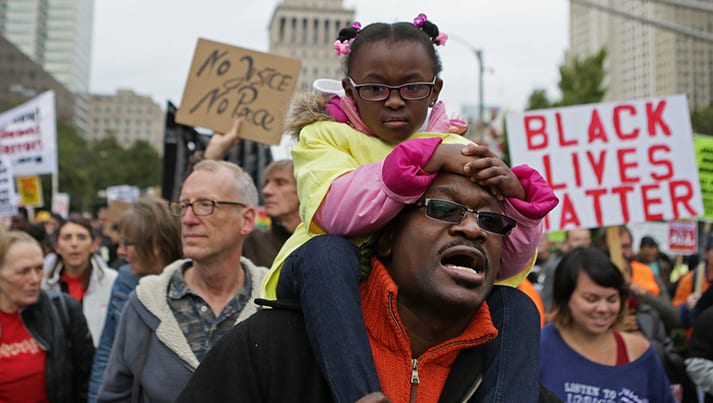We Can Be Moved

From Ferguson to Geneva in search of reproductive justice.
Join us for “Vote for Our Lives: What’s at Stake for Black Women’s Health”, a Twitter chat with Ebony Magazine and SisterSong Women of Color Reproductive Justice Collective, on Monday 10/27 at 2 pm ET. Follow #EbonyChat.
Mid-August 2014: the town of Ferguson, Missouri—along with much of the country—reels in the aftermath of the shooting of unarmed black teenager Michael Brown by a white police officer.
Meanwhile, half a world away in Geneva, Switzerland, the United Nations Committee on the Elimination of Racial Discrimination (CERD) has just convened to assess U.S. progress in addressing discrimination in policy and practice.
Sabrina Fulton, the mother of Trayvon Martin, and Ron Davis, the father of Jordan Davis, are part of the delegation from civil society. Both have come to testify about the role of race in the shooting deaths of their unarmed black teenage sons.
As the news out of Ferguson filters into Geneva’s staid UN buildings, the mood grows increasingly emotional, increasingly intense. The importance of CERD has rarely been clearer.
“Sometimes our system in the United States can feel unmovable,” says Monica Simpson, executive director of SisterSong Women of Color Reproductive Justice Collective, who joined the Center for Reproductive Rights at this year’s CERD meeting to discuss how racial discrimination interferes with women’s fundamental human right to health.
“Watching our government being held accountable dramatically shifted my perspective. We—our system—can be moved,” says Simpson. “I had a really different reaction to Ferguson than I’d had at home to the murders of Trayvon Martin and Jordan Davis. With those, I was ready to march, to get on the ground. But being in Geneva, I found myself thinking more strategically, asking how to move this crucial conversation to the international stage.”
Black women are nearly four times more likely to die from childbirth complications than are their white counterparts, according to a report the Center submitted to CERD. For black women living in the American South—where poverty rates are high and many are uninsured—the disparity is even greater. In some rural, predominantly black counties, maternal mortality rates are higher than rates in sub-Saharan Africa.
Weeks after the meeting, CERD issued concluding observations of their review of the United States. The Committee expressed concern about the widening racial disparities in reproductive health, citing the high maternal mortality rates among black women.
CERD recommended that, in addition to ensuring adequate coverage and affordable care for all, the U.S. take concrete steps to “eliminate racial disparities in the field of sexual and reproductive health.” These steps include standardizing data collection on maternal and infant mortality across states in order to effectively identify the causes of disparities, and improving monitoring and accountability mechanisms for preventable maternal mortality.
“It is an extraordinary thing for a respected international human rights body to say to the U.S. government: ‘The sky-high rate of maternal mortality in black women is not only disgraceful, it is discrimination, and we are going to hold you accountable for this human rights violation.’ In essence, CERD echoed what reproductive justice advocates have been saying for years—barriers to access are important but are only part of the problem,” says the Center’s senior human rights counsel Katrina Anderson, who represented the Center at the review.
Reproductive justice is a human rights concept that considers reproductive rights through a broader framework than traditional reproductive rights advocacy. It’s not just about a woman’s ability to decide when or if to have a child, but also about the context into which that child is born.
In addition to ensuring access to contraception and safe abortion, reproductive justice also focuses on governments’ obligation to address the social, political, and economic inequalities impacting different communities, particularly women of color. As founding executive director of SisterSong Loretta Ross has articulated, reproductive justice is about ensuring the social supports and conditions that allow all families to thrive.
The right to parent in a safe and healthy environment is integral to this obligation.
Many women of color who choose to have children have no choice but to bring them into a hostile context. The high cost of health care, poor access to providers for women who depend on publicly financed care, a lack of prenatal care, and inadequate maternal and postnatal care all increase the risk of negative health outcomes for the woman and her child. Precarious financial situations and a lack of paid parental leave mean that new mothers are often forced to return to work before they are ready.
Add this to the fear that black parents feel when confronted with discriminatory police practices such as racially biased drug laws and racial profiling. Then, the terror facing the parents of Trayvon Martin, Jordan Davis, Michael Brown, and countless other unarmed black youth targeted simply for walking down the street—due to preconceptions of them as “scary.”
It is nearly impossible for a woman to feel control over her reproductive choices when the environment she brings her child into is systemically stacked against her.
It is through this lens that the events of Ferguson melted away the odd disconnect of discussing race in America in a European capital with an Alpine view. Delegates, advocates, and Committee members alike felt the immediacy and complexity of racial discrimination, and the pressing work that remains to be done.
